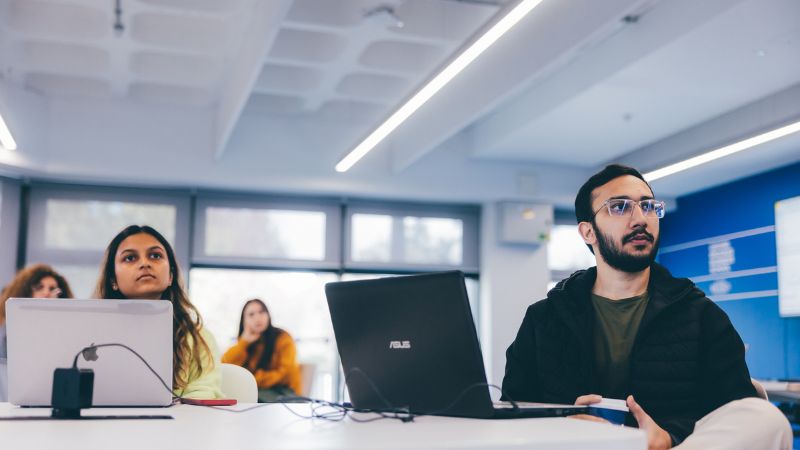UCAS code: P052719
Start dates: September 2026 / January 2027
Full time: 1 year or 2 years in sandwich mode which includes 1 year's full-time paid supervised work experience (work placement).
Part time: 24 months for UK/EU students (teaching normally structured to provide 1 whole day or 2 half days each week in the semester).
Location: Headington
School(s): Oxford Brookes Business School
Overview
Choosing the most effective influencers and Social Media tactics can transform a brand while the smart use of Artificial Intelligence has changed the way we analyse and choose marketing actions. On our MSc Digital Marketing course, you’ll learn how to use these marketing opportunities and learn how ideas can drive growth for businesses and make a positive contribution to society and globally.
Whatever you want to do after studying or coming from the world of work, you’ll gain the necessary soft and hard skills and experience to build your future career within the large spectrum of digital marketing applications and an ethical use of AI.
Marketing theory is key and we know that combining it with practical experience is the most valuable approach. You’ll have the opportunity to focus more on digital analytics or content marketing management, according to your preferences. Also, you’ll learn digital marketing and practice with real business contexts, state-of-the-art platforms and tools in our Social Media Marketing Lab to give you a competitive advantage in your employability.
Why Oxford Brookes University?
-
Business Challenge Week
Cross-faculty student teams working with local companies to address real-world business challenges.
-
Social Media Marketing Lab
Work on real-world marketing projects. Develop the skills that employers are looking for and become confident using industry software such as Brandwatch, Sprout Social and Adobe Creative Cloud
-
Responsibility at the heart, employability throughout
The course aligns with UN SDGs, so you’ll help employers tackle global challenges, use practical skills in data analysis, customer engagement, tools and crafting a standout CV.
-
Use of AI in Marketing
An ethical and proper use of AI is largely adopted in our teaching and learning experiences to get you ready for the most exciting work offers on the market.
Course details
Start this course in January or September
Study modules
Be industry ready when you graduate
By undertaking an optional work placement you can gain valuable and relevant industry experience and develop transferable skills such as communication, teamwork, networking and problem solving. A work placement can help you decide on your long-term career objectives and may lead to a job offer after graduation (would require visa sponsorship for international students).
The WAVES (Work and Voluntary Experience Service) or Careers Office will provide you with support and advice to get ahead in your career, and help you with your CV and applications. The team has access to a wide range of small, medium and large employers that offer postgraduate student work placements.
If you wish to pursue a placement at a particular company, our WAVES team can support you in making an approach to the company. Our Careers Office can also provide you with advice on how to use professional social media channels to pitch yourself to prospective employers.
Please note: As our courses are reviewed regularly as part of our quality assurance framework, the modules you can choose from may vary from those shown here. The structure of the course may also mean some modules are not available to you.
Research
Studying for your MSc in Digital Marketing at Oxford Brookes Business School offers you a first-class experience to engage with our excellent researchers. They investigate core challenges facing contemporary societies, ranging from modelling consumers’ digital behaviour, use of Machine Learning to make sentiment analysis of Social Media, content marketing optimisation and the ethical use of AI to generate compelling content. We also have expertise in influencer marketing and omnichannel retailing and are keen to include students in our projects where possible. In addition to the digital content, you can visit our research pages to learn about more research centres (Research in the Oxford Brookes Business School). Being a master's student at Oxford Brookes University offers great opportunities to be part of a research culture and to discuss your research ideas with us.

Careers
Your business skills and specialist digital marketing knowledge will be valuable for an exciting career in areas such as:
- Digital marketing
- Social media marketing/management
- Brand management
- Content analysis/development
- Market research
- Marketing analytics.
Our graduates work at major organizations and agencies worldwide, including LEGO, Mediacom, Lidl, LinkedIn, and Leo Burnett. Roles include:
- Content planning/marketing manager
- Digital channels strategist
- SEO and SEM
- Marketing automation
- Social media executive
- Owned, earned and paid media manager
- Campaigns specialist
- Account manager.
This course includes an optional placement year, offering a great opportunity to apply your skills with support from Oxford Brookes staff.
Many students join with specific career goals, while others seek a versatile Master’s in digital marketing and content analysis. If you're not ready to specialise, consider our MSc Global Marketing course, which shares some modules with MSc Digital Marketing but has a broader focus.
Student profiles
Related courses
Entry requirements
Specific entry requirements
A minimum of a second class honours degree (2:2) in any academic discipline, or equivalent overseas degree from a recognised institution.
Please also see the University's general entry requirements.
English language requirements
If English is not your first language you will need to satisfy the university's English language requirements:
- IELTS minimum 6.0 (with a minimum of 6.0 in reading and writing and 5.5 in listening and speaking)
- if you have completed your undergraduate degree in the UK (at least one full year of study) you will automatically meet our English language requirements.
Please also see the University's standard English language requirements.
Pathways courses for international and EU students
We offer a range of courses to help you meet the entry requirements for your postgraduate course and also familiarise you with university life in the UK.
Take a Pre-Master's course to develop your subject knowledge, study skills and academic language level in preparation for your master's course.
If you need to improve your English language, we offer pre-sessional English language courses to help you meet the English language requirements of your chosen master’s course.
English requirements for visas
If you need a student visa to enter the UK you will need to meet the UK Visas and Immigration minimum language requirements as well as the University's requirements. Find out more about English language requirements.
International applications
When you accept our offer, you agree to the conditions of enrolment. You should therefore read those conditions before accepting the offer.
Terms and conditions of enrolment
When you accept our offer, you agree to the Terms and Conditions of Enrolment. You should therefore read those conditions before accepting the offer.
International qualifications and equivalences
How to apply
Application process
Tuition fees
Questions about fees?
Contact Student Finance on:
Tuition fees
The full-time fees quoted are for the taught Year 1. Fees will be charged for the placement year in Year 2 and are available on request from finance-fees@brookes.ac.uk. For approximate fee levels of the placement year see the placement fee above.
The following factors will be taken into account by the University when it is setting the annual fees: inflationary measures such as the retail price indices, projected increases in University costs, changes in the level of funding received from Government sources, admissions statistics and access considerations including the availability of student support.
How and when to pay
Tuition fee instalments for the semester are due by the Monday of week 1 of each semester. Students are not liable for full fees for that semester if they leave before week 4. If the leaving date is after week 4, full fees for the semester are payable.
- For information on payment methods please see our Make a Payment page.
- For information about refunds please visit our Refund policy page
Additional costs
Please be aware that some courses will involve some additional costs that are not covered by your fees. Specific additional costs for this course are detailed below.
Optional costs
| Additional costs | Amount (£) |
|---|---|
International Business in Practice Study Trip module (inc. accommodation for seven nights, insurance, company visits and group transportation for all activities). This fee did not include international airfare, visa application fee (if relevant), dinners and activities during your free time. |
£2250-2500 |
Students may take the IDM certificate exam (our course is accredited and therefore covers the learning outcomes), paying the IDM fee. |
£125 per year |
It’s your responsibility to cover print / binding costs where coursework submission is required. Please note that a lot of the coursework is now submitted online. |
From £30 |
| You may choose to purchase books to support your studies. Many books on our reading lists are available via the Library, or can be purchased secondhand. | £20-60 per book |
Accommodation fees in Brookes Letting (most do not include bills) |
£107-301 per week |
Accommodation fees in university halls (bills included, excluding laundry costs) |
£139-248 per week |
Graduation costs include tickets, gowning and photography. Gowns are not compulsory but typically students do hire robes, starting at £41. |
Typically £0-200 |
Students are responsible for their own travel to and from university for classes. For the 2025/26 academic year, the University is introducing an alternative subsidised travel offer for all students with further information on our Travel webpages. |
From £10 |
Funding your studies
Financial support and scholarships
Featured funding opportunities available for this course.
All financial support and scholarships
Programme changes:
On rare occasions we may need to make changes to our course programmes after they have been
published on the website. For more information, please visit our
changes to programmes page.



